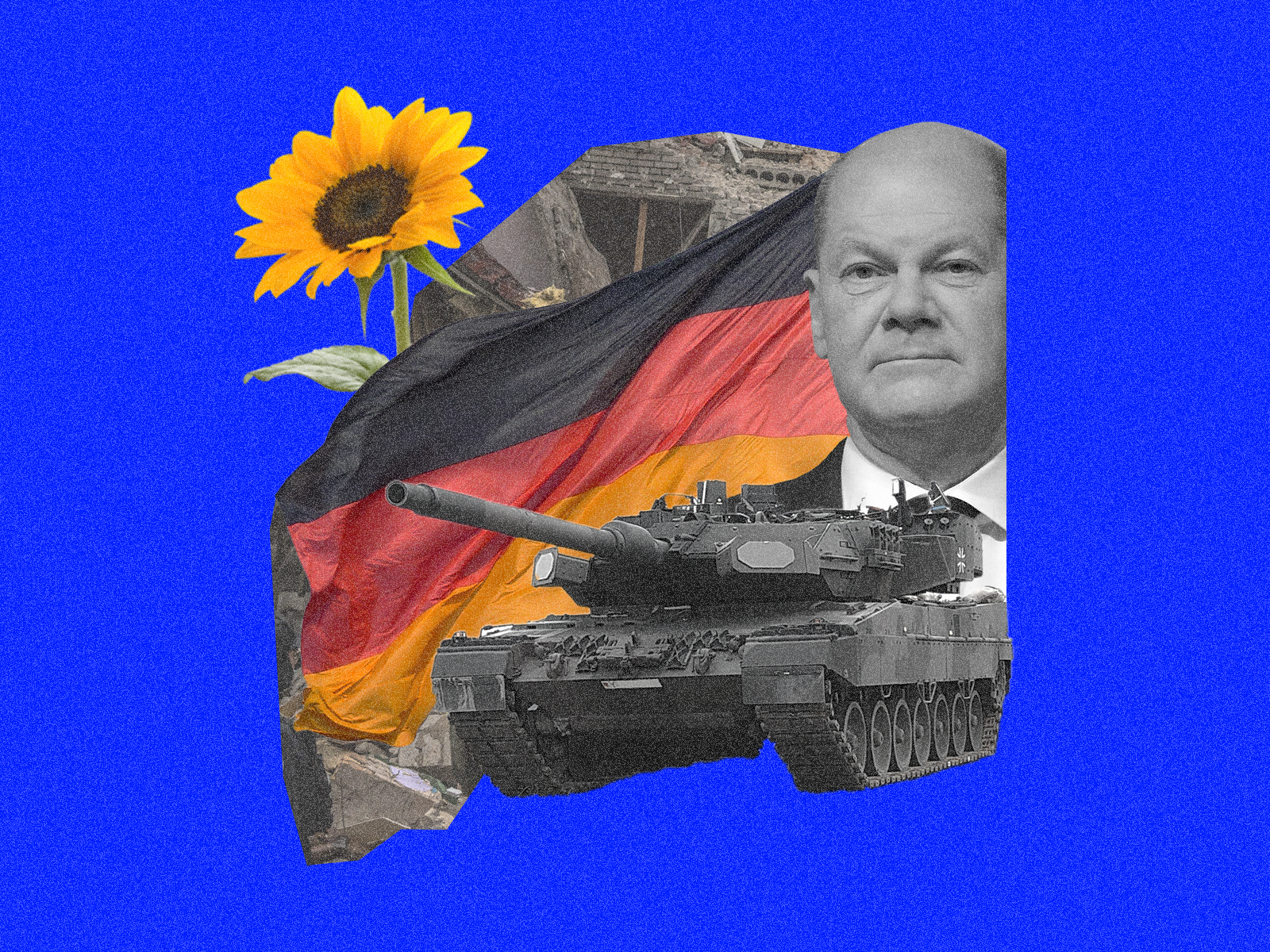The Merkel era has lulled Germans into a false sense of security that nothing needs to be done and everything will be fine, Bence Bauer, Director of the German-Hungarian Institute for European Cooperation, told our magazine. We discussed Germany’s armament, reality, and its government’s communication. Interview.
German Chancellor Olaf Scholz did not support sending Leopard tanks to Ukraine even after the meeting at Ramstein Air Base to coordinate and plan the support for Kyiv. However, a few days after the summit, the German government finally approved the Leopard tanks deal, and an international coalition was formed to support Ukraine with modern Western tanks. What is behind the change?
The case is clear: there was much pressure on Germany, on the German Federal Government. All eyes were on Germany after Finland’s and Poland’s announcements that they would provide German-made tanks to Ukraine without Berlin’s approval. And Boris Pistorius, the new German Defense Minister, has repeatedly stated that there is no definite link between the delivery dates of American and German tanks, meaning Berlin can decide independently on the support of Ukraine in the current plight. Thus, the pressure on Germany was enormous, and the Scholz-led government could not escape the demands of national and international public opinion and politics. They were able to postpone the decision for a bit, but the new defense minister and the pressure within the coalition were unsustainable from a domestic political point of view. So, the Leopard tanks will soon arrive in Ukraine.
You mentioned the international pressure and also the pressure within the coalition. But the question arises: what does German society think about delivering heavy weapons to Ukraine?
There is essentially a public demand and pressure to send weapons to Ukraine, but it is not as strong as among the politicians. The four German mainstream parties, the Greens, the Social Democrats, the Free Democrats, and the Christian Democrats, are all committed in this respect, and they have a significantly larger majority in the parliament than the German public support in this question. Public support is, therefore, much lower than the support in the German political mainstream. In the German political arena, only the far-right AfD and the descendant party of the ruling communist party oppose strongly the support for Ukraine and the delivery of tanks. Nonetheless, they are not very serious actors and have other underlying motives for the objection to supporting Ukraine. Thus, we can say that the opinion of the German political mainstream is quite clear. Still, there are minor differences; the Social Democrats are more moderate in this question, while the Greens and the FDP are firmly in favor of sending weapons to Ukraine since the first day of the war.
You also mentioned the importance of the new defense minister, who quickly shook things up after the resignation of Christine Lambrecht. What was behind Lambrecht's resignation?
There are three crucial aspects. First, the anomalies and slowness around arms deliveries; second, the slow modernization of the army; and third, the poor public communication regarding these issues. The situation was no longer manageable, and Lambrecht had to leave.

There was another quick turn. Minister of Foreign Affairs Annalena Baerbock said that Germany is at war with Russia, but Olaf Scholz soon refuted his minister's statement. What can explain such a drastic political anomaly?
The Greens’ politicians often challenge the boundaries of careful political communication; this statement is also an example. But the minister’s statement was unacceptable to the German government, so the chancellor had to refute it immediately.
When I look at today’s Germany, I often wonder: Why is Europe’s leading economic power virtually unable to implement military modernization and increase military production capacity? The upgrade of the Leopard tanks bought by Poland is years behind schedule, so it is no coincidence that Warsaw recently ordered tanks from South Korea instead. What happened to Germany?
The situation is very complicated. The explanation of the German reality and the changes in Germany is extremely complex, so let’s just focus on the army, the Bundeswehr, now. After 1989-90 the prevailing perception was that Europe had entered a period of eternal peace, a false illusion that lulled German society. This illusion has been backed up by scientific publications; we should just think of Fukuyama and the „end of history,” for instance. So, the obvious conclusion was that the country needed no military force in this environment. Military development and defense policy became neglected areas, armament had come to a standstill, and even the 2% of GDP military spending required by NATO seemed too high for Germans. German parties saw very negatively when Donald Trump demanded this amount during his presidency; the German politicians did not consider this idea realistic. They were concerned instead with how to make the army a family-friendly and „sexually diverse” workplace.
This is shocking from today’s perspective.
German society and politicians just realized now that something has gone terribly wrong. They made so many mistakes. Rheinmetall is unable to deliver the newest Leopard tanks on time, delays are common, and this already negative plight is made even worse by the general economic crisis. Force development is neglected, and the defense industry is morally and economically declining. In fact, politicians, especially the politicians of the current governing parties, saw military plants and the related crucial industrial facilities as a forgotten remnant of the old days of the militaristic era. But the situation has changed: there is now constant bidding for reaching NATO’s 2% target, with modernization and weaponization underway to compensate for years of material, personnel, and industrial neglect. The last three defense ministers played a major role in this negligence. Mentioning them in a reversed chronological order, Christine Lambrecht was simply not suitable for this position. She was not familiar with her field; she has a completely different background. But of course, when she was appointed, it was not that important who the minister of defense was. Lambrecht was preceded by Annegret Kramp-Karrenbauer, whose CDU leadership was pretty short. She only became defense minister to secure a cabinet position in case she would end up as chancellor. This position was only vacant as Ursula von der Leyen, the former defense minister and Angela Merkel’s ally, became the European Commission president in Brussels. Von der Leyen also had a couple of scandals in the Bundeswehr; she was not so competent either. The new defense minister will have to make up for lost time very quickly; he has to rebuild the German defense sector’s reputation by fixing internal relations and communication. This is a Herculean task, and we should wish him every success.
According to Niall Ferguson, a Scottish-American economic historian, Angela Merkel’s long reign as chancellor has lulled Germans into a false illusion of lasting stability. He said innovative young German people are moving to California as they cannot thrive at home. Ferguson even claimed that Germany is back where it was at the beginning of the 19th century. How far do you agree with his statements?
His words are harsh; I do not see the plight in such a radical way. Still, there is a lot of truth in his remarks: Germany has missed many opportunities for progress. The Merkel era has lulled Germans into a false sense of security that nothing needs to be done and everything will be fine. They believed they should only listen to Merkel’s advice if a problem arose. Merkel has indeed governed Germany in a skillful and smart way in many areas, taking many problems off Germans’ shoulders that should have been taken in some way or other by swallowing the bitter pill. I am referring to social policy decisions; Ferguson is right on this. Still, Germany is not returning to the 19th century; the picture is much more complex. But it is also true that many German virtues, such as punctuality, credibility, precision, adherence to deadlines, and leadership in many areas, were slowly being lost. I also experienced that Germany is a bit slower to react to things when traveling in the country, interacting with German people, or working with German organizations. As a result, it is more difficult to move things forward and make decisions in Germany.
According to the Berliner Zeitung, Hungary is becoming increasingly important for Rheinmetall, Germany’s largest defense contractor. They wrote that Rheinmetall is planning to expand its ammunition production. What are Central Europe’s interests and relations in this field today?
This is a crucial issue at the moment. The German-Hungarian economic relations are facing new challenges, but it is clear that the relationship between Berlin and Budapest is strong and stable. The Rheinmetall investment, for example, is proof of this. Hungary has a predictable economic framework with an excellent tax environment, supportive political actions, and public opinion. In Germany, this was not the case for a long time. The question is, how long will this phase last? I do not want to speak ill of Germany, but looking at the politics of the German Greens, I often get the impression that Germans tend to always jump to the other side of the fence. They were vehemently opposing the armament, and they rejected the NATO objective, but when the new geopolitical situation emerged, all of a sudden, they completely changed their minds and started a massive military buildup. We Hungarians are a bit more balanced in this respect: Hungary has already supported these military developments in the past, so there is no 180-degree change of direction in Budapest’s policies.

Bence Bauer studied Law and Economics at the University of Passau; then, he successfully completed both the German and Hungarian State Examinations in Law at the University of Bonn and the Pázmány Péter Catholic University in Budapest. After finishing his bar exam, he obtained an LL.M. degree in Comparative State and Legal Sciences at the Andrássy Gyula German Speaking University in Budapest. In Brussels, he was the Chairman of European Democrat Students (EDS), the student organization of the European People’s Party (EPP), and a member of the EPP’s Political Assembly. Until 2020 he worked for over a decade for the Konrad Adenauer Foundation (KAS) as a project coordinator and later as Deputy Director of the Hungarian Office. Since 2020 he has been Director of the German-Hungarian Institute for European Cooperation at the Mathias Corvinus Collegium in Budapest.
Graphics: Roland Molnár
Portrait: MCC

Impressions of everyday life | Interview with photographer Hanna Rédling

Floating sauna: a combination of water, fire, and air










